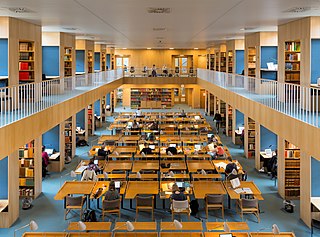Related Research Articles

A library is a collection of materials, books or media that are accessible for use and not just for display purposes. A library provides physical or digital access materials, and may be a physical location or a virtual space, or both. A library's collection can include printed materials and other physical resources in many formats such as DVD, CD and cassette as well as access to information, music or other content held on bibliographic databases.

The Open Archives Initiative (OAI) was an informal organization, in the circle around the colleagues Herbert Van de Sompel, Carl Lagoze, Michael L. Nelson and Simeon Warner, to develop and apply technical interoperability standards for archives to share catalogue information (metadata). The group got together in the late late 1990s and was active for around twenty years. OAI coordinated in particular three specification activities: OAI-PMH, OAI-ORE and ResourceSync. All along the group worked towards building a "low-barrier interoperability framework" for archives containing digital content to allow people harvest metadata. Such sets of metadata are since then harvested to provide "value-added services", often by combining different data sets.

JSTOR is a digital library founded in 1995 in New York City. Originally containing digitized back issues of academic journals, it now encompasses books and other primary sources as well as current issues of journals in the humanities and social sciences. It provides full-text searches of almost 2,000 journals.

Digitization is the process of converting information into a digital format. The result is the representation of an object, image, sound, document, or signal obtained by generating a series of numbers that describe a discrete set of points or samples. The result is called digital representation or, more specifically, a digital image, for the object, and digital form, for the signal. In modern practice, the digitized data is in the form of binary numbers, which facilitates processing by digital computers and other operations, but digitizing simply means "the conversion of analog source material into a numerical format"; the decimal or any other number system can be used instead.

A research library is a library which contains an in-depth collection of material on one or several subjects. A research library will generally include an in-depth selection of materials on a particular topic or set of topics and contain primary sources as well as secondary sources. Research libraries are established to meet research needs and as such are stocked with authentic materials with quality content. Research libraries are typically attached to academic or research institutions that specialize in that topic and serve members of that institution. Large university libraries are considered research libraries, and often contain many specialized branch research libraries. The libraries provide research materials for students and staff of these organizations to use and can also publish and carry literature produced by these institutions and make them available to others. Research libraries could also be accessible to members of the public who wish to gain in-depth knowledge on that particular topic.

WorldCat is a union catalog that itemizes the collections of tens of thousands of institutions, in many countries, that are current or past members of the OCLC global cooperative. It is operated by OCLC, Inc. Many of the OCLC member libraries collectively maintain WorldCat's database, the world's largest bibliographic database. The database includes other information sources in addition to member library collections. OCLC makes WorldCat itself available free to libraries, but the catalog is the foundation for other subscription OCLC services. WorldCat is used by librarians for cataloging and research and by the general public.

The Virtual Library museums pages (VLmp) formed an early leading directory of online museums around the world.

The eGranary Digital Library is a product of the WiderNet Project, a non-profit aimed at providing access to information technology and library services in developing countries.
The California Digital Library (CDL) was founded by the University of California in 1997. Under the leadership of then UC President Richard C. Atkinson, the CDL's original mission was to forge a better system for scholarly information management and improved support for teaching and research. In collaboration with the ten University of California Libraries and other partners, CDL assembled one of the world's largest digital research libraries. CDL facilitates the licensing of online materials and develops shared services used throughout the UC system. Building on the foundations of the Melvyl Catalog, CDL has developed one of the largest online library catalogs in the country and works in partnership with the UC campuses to bring the treasures of California's libraries, museums, and cultural heritage organizations to the world. CDL continues to explore how services such as digital curation, scholarly publishing, archiving and preservation support research throughout the information lifecycle.
The Nanyang Technological University Libraries consist of eight libraries located within the Nanyang Technological University (NTU) campus in Jurong, Singapore. All of the libraries are open to all staff and students of NTU, regardless of which faculty they belong to. Members of the public can also use library facilities and view print resources, but only members of NTU may check out materials or access electronic resources.
A reference interview is a conversation between a librarian and a library user, usually at a reference desk, in which the librarian responds to the user's initial explanation of his or her information need by first attempting to clarify that need and then by directing the user to appropriate information resources.
Library instruction, also called bibliographic instruction, user education and library orientation, consists of "instructional programs designed to teach library users how to locate the information they need quickly and effectively. [It] usually covers the library's system of organizing materials, the structure of the literature of the field, research methodologies appropriate to the academic discipline, and specific resources and finding tools " It prepares individuals to make immediate and lifelong use of information effectively by teaching the concepts and logic of information access and evaluation, and by fostering information independence and critical thinking. Above all they are aimed at equipping library users with skills to locate library sources and use them effectively to satisfy their information needs.
Paul Conway is associate professor in the University of Michigan School of Information and has worked with Yale University and Duke University Universities after starting his career at the Gerald R. Ford Presidential Library. His research and educational work focuses primarily on digital preservation and electronic media. He has published extensively throughout his career on library preservation, conservation issues, and education of library and archives personnel.
Chronicling America is an open access, open source newspaper database and companion website. It is produced by the United States National Digital Newspaper Program (NDNP), a partnership between the Library of Congress and the National Endowment for the Humanities. The NDNP was founded in 2005. The Chronicling America website was publicly launched in March 2007. It is hosted by the Library of Congress. Much of the content hosted on Chronicling America is in the public domain.
A digital library, also called an online library, an internet library, a digital repository, or a digital collection is an online database of digital objects that can include text, still images, audio, video, digital documents, or other digital media formats or a library accessible through the internet. Objects can consist of digitized content like print or photographs, as well as originally produced digital content like word processor files or social media posts. In addition to storing content, digital libraries provide means for organizing, searching, and retrieving the content contained in the collection. Digital libraries can vary immensely in size and scope, and can be maintained by individuals or organizations. The digital content may be stored locally, or accessed remotely via computer networks. These information retrieval systems are able to exchange information with each other through interoperability and sustainability.
The Faculty Of Science is one of the four faculties which make up the University of Strathclyde, in Glasgow, Scotland. The faculty contains a number of departments offering various undergraduate and postgraduate courses.
A pathfinder is a bibliography created to help begin research in a particular topic or subject area.. Pathfinders produced by the Library of Congress are known as "tracer bullets". What is special about a pathfinder is that it only refers to the information in a specific location, i.e. the shelves of a local library.
Anita Coleman is an Indian American academic librarian, faculty and researcher in digital libraries. Anita Coleman is also the founder of an interdisciplinary open access repository, dLIST - Digital Library of Information Science and Technology.
Libraries in virtual worlds are part of an immersive 3D environment that can be used for entertainment and educational purposes. Due to increasing interest in digital services, some libraries and librarians have established virtual services in Second Life and other virtual worlds.
The Ohio State University Libraries are the collective libraries of the Ohio State University and its satellite campuses. This system welcomes Ohio State faculty, students, visiting scholars and the general public to study and research. It includes ten libraries located on the Columbus campus, six libraries on the regional campus of the university and nine special collections. The Ohio State University Libraries offer educational resources and services to support readers to research, learn and teach. They can help researchers find and borrow physical and digital materials from articles, journals, databases, books, dissertations, theses, newspapers, streaming videos and images, etc. The Ohio State University libraries hold over six million volumes in traditional library formats and more in electronic information resources.
References
- Warwick, Claire; Terras, Melissa; Galina, Isabel; Huntington, Paul; Pappa, Nikoleta (2008). "Library and information resources and users of digital resources in the humanities". Program. 42 (1): 5–27. doi:10.1108/00330330810851555.
- Reid, Gordon (2001). "A Digital exhibition: The Powys digital history project, 1996-2001". Journal of the Society of Archivists. 22 (2): 161–176. doi:10.1080/00379810120081118. S2CID 109897377.
- Reid, Gordon (2000). "The digitisation of heritage material: arguing for an interpretative approach based on the experience of the Powys Digital History Project". Program. 34 (2): 143–158. doi:10.1108/eum0000000006930.
- Tedd, Lucy A. (2006). "Program: a record of the first 40 years of electronic library and information systems" (PDF). Program. 40 (1): 11–26. doi:10.1108/00330330610646780.
- Llwyd, Rheinallt (2006). "The Digital Age and Local Studies". Program. 40 (2): 192–194. doi:10.1108/00330330610669316.